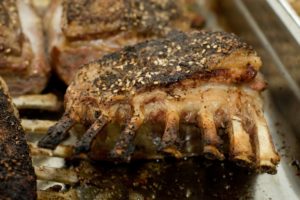Question: Can dogs eat lamb bones?

Answer: Raw lamb bones are ok for dogs in moderation but still are not entirely safe. Cooked lamb bones are always dangerous and should never be given to your dog. Overall, I would not recommend giving dogs lamb or any other bones on the safe side.
If you want to know the difference between cooked and raw lamb bones for dogs and other relevant information, please read a short explanation below.
Are Lamb Bones Safe for Dogs in General?
Almost any raw bones are better for dogs than cooked ones because cooked bones can easily splinter and damage the guts of your pet.
Why?
- Raw lamb bones are flexible enough not to break up into sharp shards. So, you can occasionally give your dog a raw lamb bone to chew.
- Cooking (i.e., roasting) changes the bone structure, so cooked lamb bones are very brittle. They tend to shatter quickly and splinter into long sharp pieces. Those little “needles” are usually sharp like glass and, in their turn, might cause different internal injuries to your dog.
Everything seems to be clear now.
Nope.
So, Can Dogs Have Lamb Bones or Not?
There is still no clear answer, though.
Even though raw lamb bones usually are generally safe for dogs, they still can be a threat to the health of your pet.
Dogs sometimes crunch and scoff bones in seconds, no matter how big they are. And even raw lamb bones not appropriately chewed can cause different oral problems, injure a dog, or even kill it:
- A dog can break its teeth when chewing on lamb bones.
- The same reason can cause cuts and painful wounds in the mouth or on the tonsils.
- If a dog swallowed a large chunk of a lamb bone, this piece can get lodged and cause choking.
- Not fully digested lamb bone can cause vomiting and diarrhea.
- Raw lamb bones might contain an enormous number of germs and parasites.
- Some lamb bones are big enough to get stuck in the dog’s esophagus, stomach, or intestines, which may cause internal bleeding and painful death.
Those of you who think, “I have been feeding my dog raw bones for years, and nothing has happened yet,” should think about such things as a lack and chances.
If there is even a little chance that lamb bones might harm, you should never give them to your dog.
My Dog Ate Lamb Bones: What Should I Do?
You are not always nearby and can catch them when trying to steal something from your plate or a garbage can.
So, how worried should you be if your dog has already swallowed a lamb bone? And what should you do?
In most cases, everything will be fine, but you should keep an eye on any dubious symptoms anyway.
There are some simple rules to follow if your dog ate lamb bones:
- Do not provoke vomiting. Experienced vets do not recommend inducing vomiting to extract solid objects like lamb bones. Lamb bones are pretty sharp and might potentially create problems on their way back up.
- Check your dog’s stool to wait for the bones. If you see any signs of bleeding, take him to the vet immediately.
- Watch for your dog’s behavior. If he becomes sad or apathetic, take him to a vet immediately.
Also, calling your vet will never be a bad idea, and you can start from it.
Conclusion: Can Dogs Have Lamb Bones? (No!)
Overall, dogs can eat lamb bones in the raw state, while eating cooked ones can be fatal. However, even if you give your dog cooked lamb bones only, there still can be some risks involved.
The most dangerous for dogs are poultry (chicken, turkey, etc.) bones, but lamb ones are maybe in the second place in this rating.
The main question is not, “can dogs eat lamb bones or not?”.
Contrary to common belief, it is not safe to give your dog any bones at all. Authoritative vets recommend not to give any animal bones to dogs, and I think this should be a rule of thumb for any dog owner.